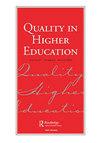A knowledge-based model on quality management system compliance assessment for maritime higher education institutions
IF 1.1
Q3 EDUCATION & EDUCATIONAL RESEARCH
引用次数: 5
Abstract
ABSTRACT A quality management system is an essential and mandatory instrument for maritime higher education institutions mandated by the International Convention on Standards of Training, Certification, and Watchkeeping for Seafarers. To design an effective quality management system, it is strongly recommended to take the most comprehensive model of the quality system such as ISO 9001 quality management system. This paper proposes a knowledge-based model for assessing the compliance level of the quality management system of maritime higher education institutions with respect to ISO 9001:2015 to provide meaningful information to design an effective quality management system, to identify potential gaps and required improvement points in the quality management system. In the proposed model, fuzzy axiomatic design is selected as a suitable research methodology. The obtained results provide a decision aid for the relevant executives in maritime institutions who design a quality management system integrated with ISO 9001:2015 guidelines.基于知识的海事高等院校质量管理体系符合性评估模型
质量管理体系是《国际海员培训、发证和值班标准公约》规定的海事高等教育机构必不可少的强制性工具。为了设计一个有效的质量管理体系,强烈建议采用最全面的质量体系模式,如ISO 9001质量管理体系。本文提出了一个基于知识的模型,用于评估海事高等教育机构质量管理体系对ISO 9001:2015的符合性水平,为设计有效的质量管理体系提供有意义的信息,以识别质量管理体系中的潜在差距和需要改进的点。在该模型中,选择模糊公理设计作为合适的研究方法。所得结果为海事机构设计与ISO 9001:2015指南相结合的质量管理体系的相关高管提供决策辅助。
本文章由计算机程序翻译,如有差异,请以英文原文为准。
求助全文
约1分钟内获得全文
求助全文
来源期刊

Quality in Higher Education
EDUCATION & EDUCATIONAL RESEARCH-
CiteScore
3.30
自引率
14.30%
发文量
32
期刊介绍:
Quality in Higher Education is aimed at those interested in the theory, practice and policies relating to the control, management and improvement of quality in higher education. The journal is receptive to critical, phenomenological as well as positivistic studies. The journal would like to publish more studies that use hermeneutic, semiotic, ethnographic or dialectical research as well as the more traditional studies based on quantitative surveys and in-depth interviews and focus groups. Papers that have empirical research content are particularly welcome. The editor especially wishes to encourage papers on: reported research results, especially where these assess the impact of quality assurance systems, procedures and methodologies; theoretical analyses of quality and quality initiatives in higher education; comparative evaluation and international aspects of practice and policy with a view to identifying transportable methods, systems and good practice; quality assurance and standards monitoring of transnational higher education; the nature and impact and student feedback; improvements in learning and teaching that impact on quality and standards; links between quality assurance and employability; evaluations of the impact of quality procedures at national level, backed up by research evidence.
 求助内容:
求助内容: 应助结果提醒方式:
应助结果提醒方式:


